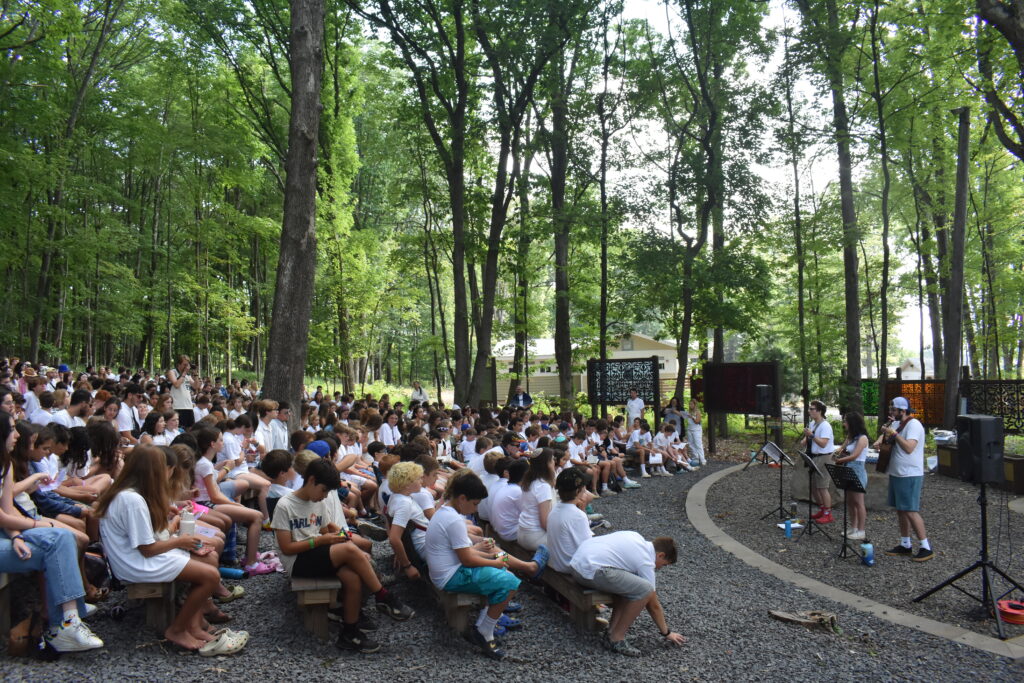 Shabbat Readings and Remarks from Sharon and Galil Campers and REDI and Camper Care Manager Lori Zlotoff – August 4th and 5th
Shabbat Readings and Remarks from Sharon and Galil Campers and REDI and Camper Care Manager Lori Zlotoff – August 4th and 5th
Sharon’s Friday Night Service
Alec and Zachary
Z: This service our middah Rachamim. Rachamim translates to merciful, but here at camp we see it as acting with your heart.
A: I once acted with my heart when my cousin Bubbles Was very homesick. I comforted in till he was felling better.
Z: I acted with my heart by doing my bunkmates nikayon job while he was in the Mirp.
A: The unit of Sharon wants you to think about a time when you acted with your hearts.
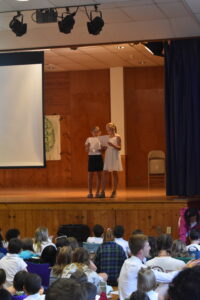
Penelope and Alice
P: The Barchu reminds us to check in with ourselves, to make sure we are ready to let help come to us when we need it.
A: At Camp Harlam there are lots of times when someone uses Rachamim and acts with their heart, but we also have to use Rachamim for ourselves, to be ready to get help.
P: This year was my first year at camp and I was really nervous. However, my caring bunk mates and counselors welcomed me with open arms. Whenever I think of Rachamim, it reminds me of this act of kindness. While people may consider their actions small, they had a huge impact on me. I also used Rachamim towards myself to allow myself help when I needed it.
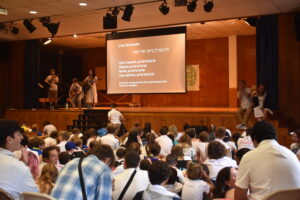
A: Another example of Rachamim is during Nikayon. Everyone in our bunk are willing to help each other. It helps us improve our score a lot. Everyone in our bunk feels that they can always get help when they need it.
P: As we sing the Bar’chu and declare we are ready to pray and talk to God
A: We also open our hearts with the middah of Rachamim.
Together: Please rise and join us for the Bar’chu
Miri, Lilly and Ellie:
Miri: This week’s middah is Rachamim which means acting with your heart.
Ellie: There are many ways to act with your heart. One time I comforted my friend when they were homesick
Lilly: Being homesick means missing the people you can’t see. It’s like the stars, you sometimes can’t see them, but they’ll always be there to guide you with their bright light.
Miri: The Ma’ariv Aravim prayer is the prayer of the night turning to day, light
turning to dark. In the day we have enough light. At night we have the stars. Just like at home we have our parents, but at camp we have our friends to cure us of our homesickness.
Ellie: In my first year of camp, I was really homesick, but my friends really helped me, and now in my third year I can comfort them.
Lilly: we hope you find the meaning of Rachamim as we join in Ma’ariv Aravim.
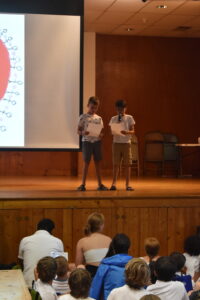
Hannah and Ariella
Hannah: The Sh’ma is about believing in God.
Ariella: And Rachamim is about acting with your heart.
Hannah: with acts of love
Ariella: or kindness
Hannah: The word Sh’ma means listen
Ariella: and sometimes that’s all we need, someone to listen us.
Hannah: From sharing an exciting story to crying about being homesick. We all need someone to listen to us.
Ariella: God is able to find a place in God’s heart for all of us.
Hannah: through the good or the bad.
Ariella: we are supposed to follow God’s lead and care abut everyone.
Hannah: We are supposed to be kind and find a place for them in our heart.
Together: According to your custom please rise for the Shema
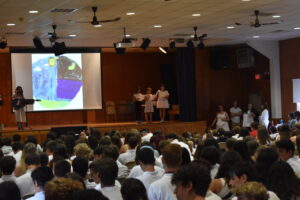
Alex and Tali
Alex: Sometimes at night I think about what I did in my day. I think about how I could improve as a friend. I wonder if my friends showed more Rachamim than I showed to them with my actions. When I shared this with my friends, they acted with their hearts by reminding me what I did for them and told me that I was also a good friend. Nighttime is a place and time to think of how I can do better on what I have already done. The Hashkivenu prayer helps us at bedtime, and reminds us God is protecting us, no matter what we have done during the day.
Tali: When I think of Hashkivenu my mind goes to the staff who protect us all day long. They come to camp out of their choice, they didn’t have to come to camp. They show so much Rachamim by putting our needs ahead of theirs, like letting us shower first during shower hour.. I see them act with their heart every night as well, like when they are on Shmirah. They aren’t on their phones, or doing other things. They watch us sleep and make sure that we are safe. If someone has trouble sleeping or is homesick they are always here to help. They sacrifice their own summer for us and I thank them for that. I would not feel safe without them.
As we sing the Hashkivenu we think of how those who protect us use Rachamim.
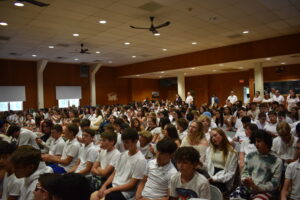
Sammy and Noah
S: This week’s middah is Rachamim, acting with your heart
N: We act with our hearts when we put others in front of us
S: There are a lot of ways you can act with your heart. Most ways start with being a good person.
N: Difference is nothing new to Shabbat, from Shmoo’s Mi Chamocha to so many different versions of the Amidah
S: The silent prayer is very different from other prayers. Now, we communicate with God differently, each of us using our own words.
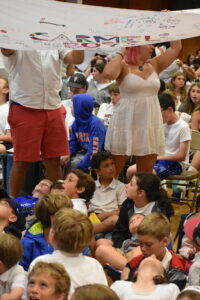
N: The silent prayer is a way to disconnect from the rest of camp like we both do in the bunk.
S: I hope we can show Rachamim throughout the rest of camp as we join in the silent prayer; listening to ourselves in our hearts.
Aliza, Noa and Sophia
Noa: Rachamim means acting with your heart
Sophia: What does acting with your heart mean to you?
Aliza: To me it means getting the batman card when we’re playing Apples to Apples and giving it to someone else, and being the shower exterminator.
Noa: To me, it means getting rid of the dead wasp on the window, because everyone was upset and screaming about it.
Sophia: To me it means the first time I had showers in nikayon one of my friends helped me clean the showers. It was actually very easy!
Together: This Shabbat we challenge you to find out what Rachamim means to you. Shabbat Shalom [Sharon]!
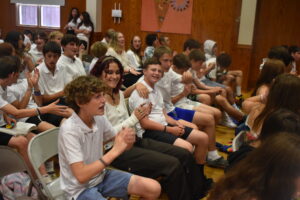
Davis,Benji,and Cap
This week’s middah is Rachamim. Rachamim means to act with your heart.
Acting with your heart at camp can be many things including talking for a friend when they lost their voice, cheering up a sad friend and letting a friend borrow a pencil.
Acting with your heart in even the smallest ways can brighten the camp experience and bring our community even closer together.
D’Var Torah from REDI and Camper Care Manager Lori Zlotoff
If you know me well, you know that I am a big fan of metaphors. Stories or
images that help explain a feeling or event – sometimes anxiety can be compared to waves in an ocean, sadness can become cars of a train, or worries can get put onto shelves in a closet. When I think hard about everything that is amazing about camp, I always go back to the same image of synapses of the brain – in my mind’s eye, this looks like sparks of light shooting from one cell to another cell, creating energy and light, propelling them around to do their job of keeping us healthy and activated. This is what I see as being so incredible about camp. With the absence of distractions like technology, schoolwork, activities and obligations, camp allows us to truly be free and settled and calm so that we can have meaningful, intentional and thoughtful interactions with one another. And every time we connect with another person without any of those distractions in the way, it feels like we are lighting a spark that activates goodness and positivity. This not only benefits the two people who give and receive light, but the whole community lights up as a result. The radar map of energy over camp Harlam must be buzzing over the summer. What drives these connections of positive energy can best be described as this week’s middah of Acting With your Heart. Every conversation, every hug, every connection whether it’s verbal, a high five or a toss of the ball is an act of the heart. These are deep, meaningful, authentic, intentional IRL connections that we hope fill you up and last you all year long. Not only is our community changed for the better, but so we are, inextricably changed for good. And, the only other thing I love more than a good metaphor is musical
theater. And I’ve been told that there’s no better way to wrap up a d’var than in
song. This song from Wicked about friendship speaks for itself.
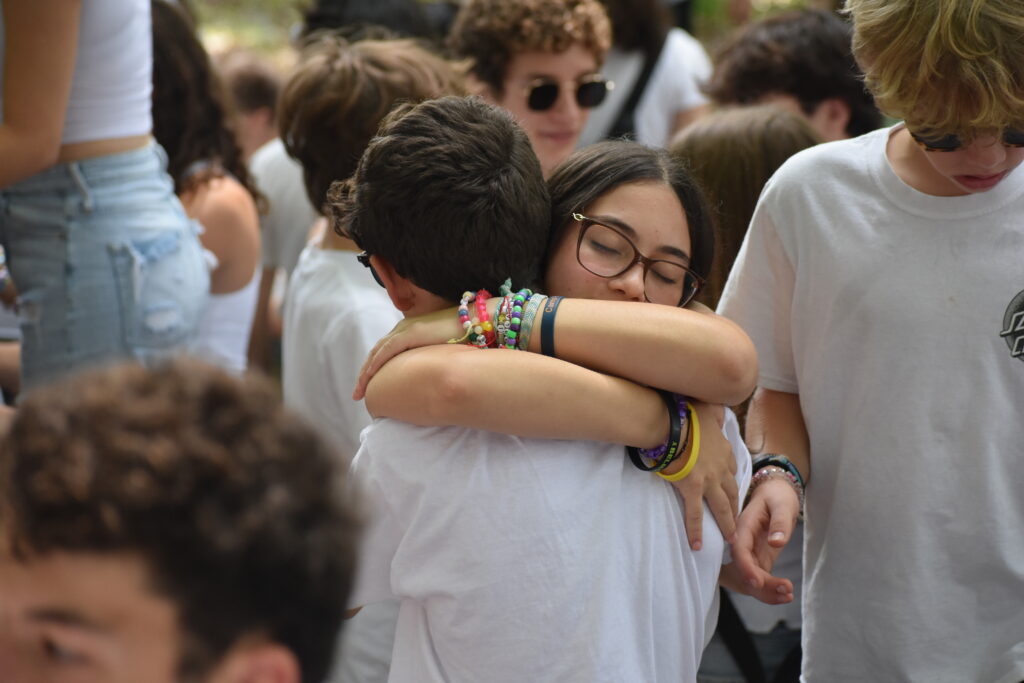
Galil’s Saturday Morning Service
Sammy, Zack, Noam, Elijah, Josh
Sammy: We all met in Carmel…
Zack: is how every Camp Harlam speech starts, so we wanted to change it up.
Noam: All of the speeches are about us showing confidence, so we wanted to ask our counselors how they demonstrate confidence and independence and what Bitachon Atzmi means to them.
Elijah: Our international counselors demonstrate confidence by coming to a completely different country and meeting new people.
Josh: Another way our counselors demonstrate confidence is by unapologetically being themselves every day and making independent decisions all the time.
Sammy: Our counselors spend months away from their families to take care of us.
Zack: We hope our counselors’ ways of showing Bitachon Atzmi can inspire you, just like it inspires us.
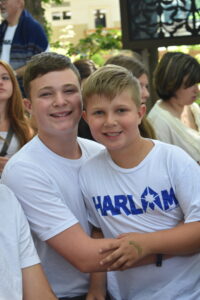
Liza, Lila, Maya, Liv, Stella
Liza: Chadar breakfast to Ulam breakfasts…
Lila: Warm showers to cold showers…
Maya: Hillside to villages…
Liv: 5-mile hikes to 10-mile hikes…
Stella:Little buddy to big buddy
Liza: All these changes we’re going to experience on our journey from junior camp to senior camp.
Maya: Throughout junior camp we’ve gained confidence and independence from our counselors and role models.
Stella: As we prepare for senior camp, we use everything we’ve learned to be our best selves.
Liv: The Bar’chu helps us to prepare to pray, just as our counselors and role models helped us to prepare for our last two years as campers.
Lila: As we start our service, we invite you to think about how you can find your own confidence and independence, as we approach the last week of camp.
Talya, Sadie, Talia, Sophie
Talya: Recently Galil went on a hike. One way we used confidence and independence was starting out the hike with confidence that we could complete it, which made our day better. Throughout the day we continued to use Bitachon Atzmi and learned why it is important.
Sadie: Once we got back to camp, we set up our tents in the soccer fields. Our Counselors and Unit Heads told us to be independent to build our tents. After many trials every group set up tents. After many trials, every group set up tents.
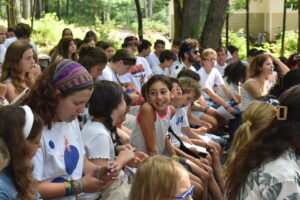
Talia: During dinner there was a very big storm, and all of our tents got flooded with all our stuff for the night in them. Because of the storm we weren’t able to sleep in our tents, but had a fun night regardless.
Sophie: When we say the Yotzeir Or, we think of creation of light and darkness. Just like how the sun lights up the dark night in the morning, we kept finding the light in what could have been a dark situation.
Zinnia and Maddie
Z: This week’s middah is about confidence and independence
M: Ever since we met in Carmel, we have learned how much confidence it takes to come back each year.
Z: Leaving home for three and half weeks summer after summer takes confidence and independence.
M: Even the little things, like asking the kitchen for more butter, takes confidence and independence.
Z: The Sh’ma is about listening to One God, just like how you have to listen to yourself to do what’s right.
M: You need independence to listen to yourself when you need a break and confidence to say something when you know your friend is in the wrong.
Z: Being the last unit in junior camp, we learned that you have to have independence to take on the responsibilities we now have.
M: Now that we’re older we have to be role-models for the younger units and be confident in our actions
Z: You should always be confident in what you do and the independence to be yourself.
M: Please stand or sit according to your custom for the Sh’ma.
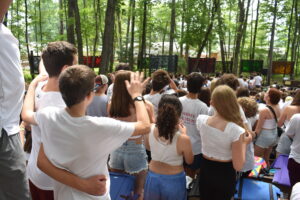
Becca, Danna, Shayn, Riley, Liora
Becca: The Mi Chamocha is about freedom and justice. It is also about finding yourself amongst struggle.
Danna: We all find the struggle at camp. Considering this is my first year at camp and away from home, I’ve been faced with challenge along with opportunity. With my new independence, I’ve been able to find and continue to search for my place.
Shayna: My place is being with the same people year after year and nerve-wracking after having the first homesick night. Completing the Galil hike, or doing the treehouse sleepover. With this scared feeling also comes the sense of independence.
Riley: When the Israelites had escaped Egypt they needed to be independent. I can relate to this, because I am the second oldest and now that I have become a Bat Mitzvah, I have many more responsibilities, and I have to start figuring things out on my own. My new responsibilities can offer more opportunities.
Liora: At camp we all have new independence, especially by being away from our family and friends. Although this independence comes with new challenges and responsibilities. It opens up new opportunities. By living in a bunk, we each have the independence to take tare of ourselves and others which gives us new confidence and ability.
Becca: Camp makes us feel special and holy, and gives each one of us the strength to break the mold.
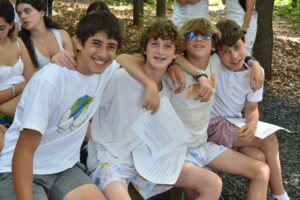
Lola B and Rachel S
Both: What does Bitachon Atzmi , confidence and independence, mean to you?
Lola: To us, it means being able to take care of ourselves, and be comfortable in our own bodies.
Rachel: When I wake up I gain confidence from seeing the self affirming messages on the bathroom mirrors that my bunk and I wrote.
Lola: To me, having confidence means standing out from the others and having the right mindset to put in 100% in the activities I participate in. When I’m dancing in front of an audience, I find the confidence to try my best in each routine and give as much energy as I can.
Rachel: Bitachon Atzmi also talks about independence. Now that we are in an older unit, we have taken on more of our own responsibility and been less reliant on our counselors.
Lola: Throughout the service, you have heard from our unit about confidence and independence.
Rachel: Think of ways you can find Bitachon Atzmi.
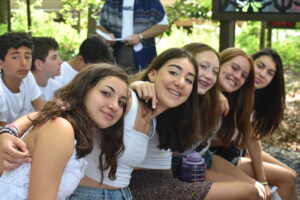
Shabbat Sha-raps:
It’s Saturday morning and the peeps are here. It’s time for Shabbat let me get a cheer. We’re talking about Moses Aaron and the Levites too. Come on Galil let me get an Awoo!
What’s up my Jews, we’re here to tell you the news about how Moses led our people to the cow that moos.
They’re tryna leave the desert, got nothing to lose.
Moses’ death was not very funny, at least we got to the land of the honey and the grains,
it was the prize after all the pains.
Moses knew his time was near
and all the Israelites were full of fear.
We gathered the crowd and said listen to me now,
he told them what they did was wrong, like worshiping the cow.
When it was him all along he told the people to look and see
but he never said, “It was really me.”

